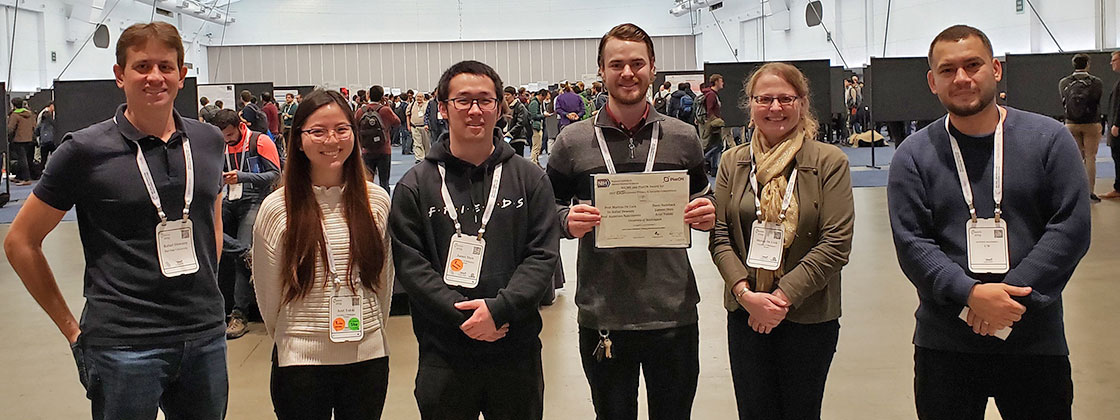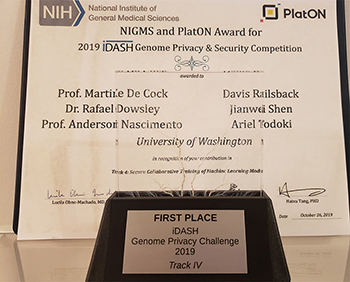
Engineering & Technology Team Wins iDASH 2019 Competition
UW Tacoma’s growing prominence in privacy-preserving machine learning is gaining accolades.
(Photo above: UW Tacoma team at iDASH 2019 workshop. From left: Dr. Rafael Dowsley, Ariel Todoki, Jianwei Shen, Davis Railsback, Dr. Martine De Cock, Dr. Anderson Nascimento.)
A team of UW Tacoma School of Engineering & Technology faculty and students recently won first prize in a major international biomedical data and artificial intelligence competition.
The iDASH Secure Genome Analysis competition is funded by a grant from the National Institutes of Health. The goal is to “evaluate the performance of state-of-the art methods that ensure rigorous data confidentiality during data analyses in a cloud environment.” The growth of genome data has pushed the storage capacity of traditional servers. The current idea is to store this information in the cloud but technology is needed to ensure privacy.
The competition was organized around four tracks. The UW Tacoma team won track four, “Secure Collaborative Training of Machine Learning Model.” More than 100 teams from 17 different countries registered for the competition; there were 64 submissions for track four, with nine teams making it to the final round of judging. Two other teams, Alibaba Gemini Lab and Ant Finance Service Group, tied with UW Tacoma for first place. A team from the Massachusetts Institute of Technology (MIT) received an honorable mention.
UW Tacoma’s team was led by Dr. Martine De Cock, professor, and Dr. Anderson Nascimento, associate professor.

“By winning this competition, we’ve demonstrated that UW Tacoma is not just ‘among the top’ in this field, we are the top,” said De Cock. “We had two computer science and systems graduate students — Ariel Todoki and Jianwei Shen — who leveraged their knowledge of machine learning; and a computer engineering undergraduate — Davis Railsback — who worked relentlessly for months to optimize our solution for speed,” she said. The team also included Dr. Rafael Dowsley, a post-doctoral researcher at Israel’s Bar-Ilan University.
The challenge the team had to address is one fundamental to everything happening in the artificial intelligence field today: how to establish the baseline knowledge of programs that are becoming more and more able to learn on their own.
In the iDASH challenge, the problem was to design a training algorithm that could “teach” a machine-learning module in a way that preserves the privacy of the data with which the machine works. To win, the algorithm had to run the fastest, at the lowest cost in computing time, and with the highest score in correctly categorizing large sets of test data.
Nascimento said winning the competition culminates four years of work in the field of privacy-preserving machine learning (PPML). “I believe we won for one main reason,” he said. “Our team consisted of people with expertise from several different areas relevant to this field. We had experts in cryptography, in machine learning, and in low-level systems programming.”
Nascimento said the team’s submission was based heavily on Lynx, a framework for privacy preserving machine learning that students and faculty at UW Tacoma have been actively developing and open-sourcing for the last three years.
The UW Tacoma team beat out competitors from prominent research universities like MIT and major international companies such as IBM. The other two first-place winners are both affiliated with Alibaba Group, a China-based company that is described as the world’s largest retailer and e-commerce company.



